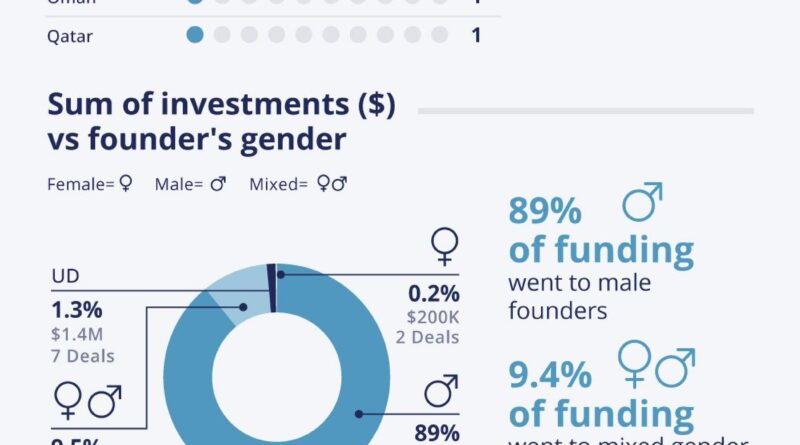MENA startups raised $116 million in June 2024, bringing the H1 total to $882 million.
Investment activity in the MENA startup space eased in June 2024, as 38 tech startups raised $116 million, bringing the half-year total to $882 million.
The amount attracted in June decreased by 59% compared to the same period last year, but increased by 182% compared to the same period last year.
UAE-based startups led the region last month with $82.5 million in funding across 15 deals. Egyptian startups ranked second with $15 million invested by four companies. Saudi Arabia dropped to third place with 7 startups raising $13.5 million. Significant activity was also seen in Iraq, with six startups raising around $1.2 million, although the figure could be higher as Orisdi, BonLili and Alsaree3 did not disclose the value of their investments.
Last month was marked by an absence of big deals, with June’s biggest ticket volume going to Tenderd’s $30 million deal.
By sector, fintech reclaimed its position as the most funded sector in June, securing $38 million across 10 deals, followed by Contech, thanks to a Tenderd deal. Meanwhile, three pro-tech startups raised $19.6 million in June, surpassing May.
Most of June’s funding went to the Pre-Series A stage, as four startups received $45 million, followed by the Seed stage, where five startups raised $27.3 million. However, when considering investment volume, early-stage startups continue to attract investors, with eight startups receiving $3 million in seed funding and another eight receiving $140,000 in funding.
Startups operating a business-to-business (B2B) model received the most funding in June, raising $66.4 million in 18 deals, accounting for 74% of total funding, while 20 business-to-business startups Consumer (B2C) attracted $49.5 million. .
As always, male startups attracted the vast majority of funding, receiving $103.4 million, or 89 percent of the total, while only two female-led startups managed to raise $200,000.

What has changed in the first half of 2024?
The uncertainty caused by the war in Gaza and possible military escalation in the region has cast its shadow over the startup ecosystem, forcing regional and international venture capital (VC) firms to adopt a “wait and see” stance. That resulted in a 46 percent drop in total funding in the first half of the year, down from $1.6 billion recorded in the same period in 2023. to 12 percent
Notably, the second quarter (Q2) of 2024 saw a slight increase in funding, where 98 startups raised $453 million, a 5 percent increase over the $429 million in the first quarter and 9 percent compared to the same period. It decreased in 2023.
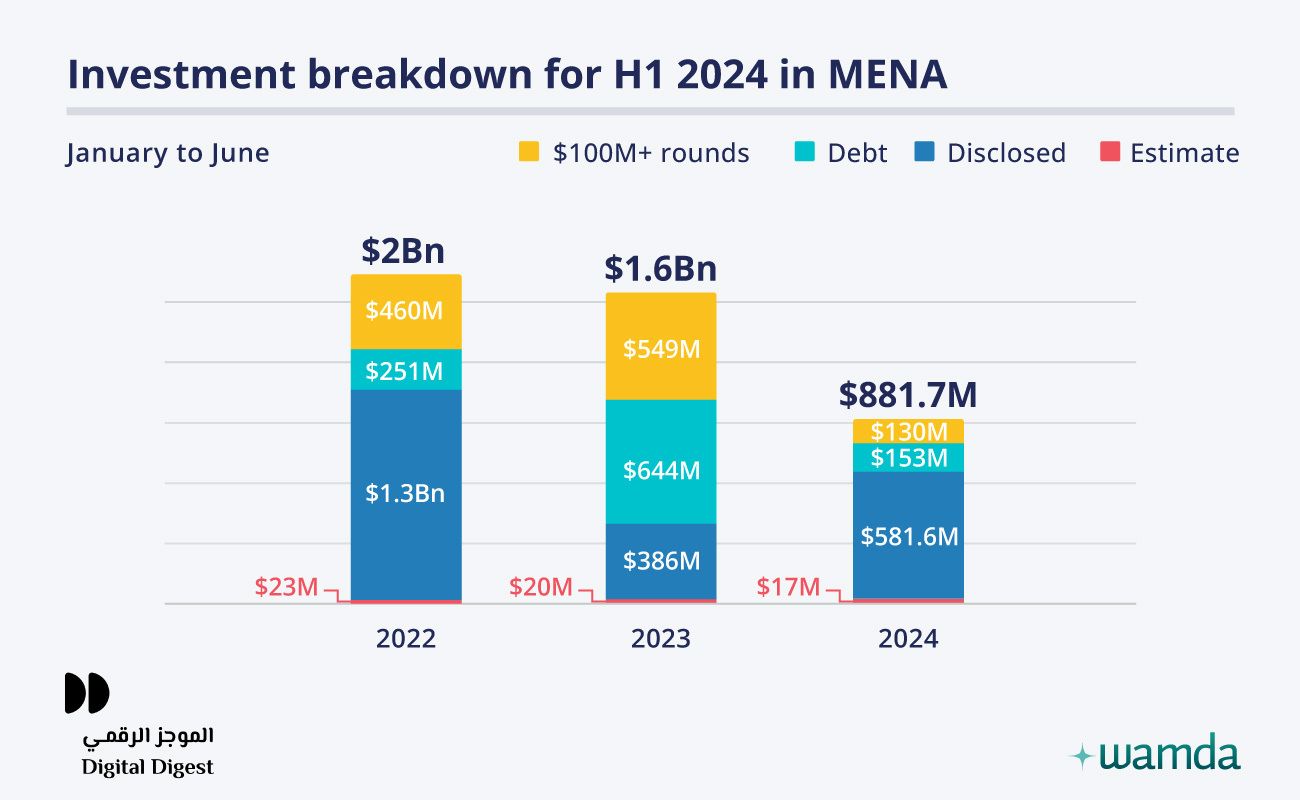
Where capital is concentrated
The UAE maintained its position as the top funding ecosystem in the region with 91 UAE-based startups raising $455.5 million in the first half of 2024, up from $604 million claimed in the first half of 2023. were reduced, and then KSA was reduced by absorbing $300 million of the total budget. from $554 million last year.
Despite the heavy investment of GCC countries in Egypt’s real estate and tourism sectors, the economic crisis has deepened in the country, which has absorbed a national debt of 96.4% of the gross domestic product (GDP) and the inflation rate has stubbornly declined. 32.5 percent, along with the energy crisis that has left households in the country in the dark for up to six hours a day.
As a result, Egypt’s startup ecosystem lost its strength in the first half of this year, and only 33 startups were able to attract $83 million, which is an 80% decrease compared to the same period last year.
Meanwhile, Morocco’s ecosystem gains momentum with six startups receiving $12.5 million.
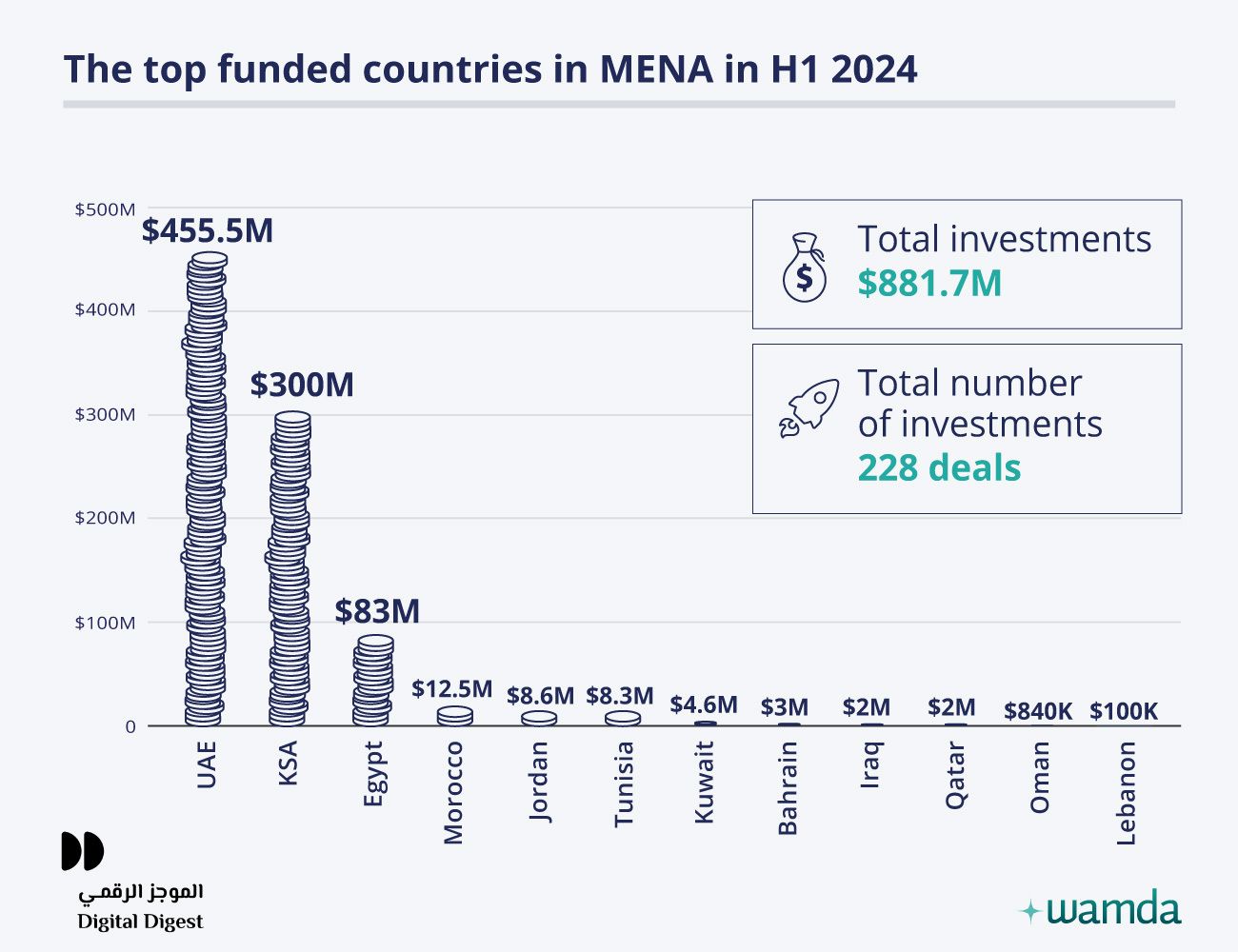
Is the fintech era over?
In the first half of this year, proptech emerged as one of the investor’s most popular sectors, raising $200 million in 14 deals, replacing fintech as the most invested, raising $156 million from 50 deals.
SaaS startups took third place with $164 million in 23 deals, followed by e-commerce startups with $33.6 million in 19 deals, down from $194 million in the first half of 2023. Foodtech also saw a significant decline, falling from $183 million in 2023 to $2. In 2024
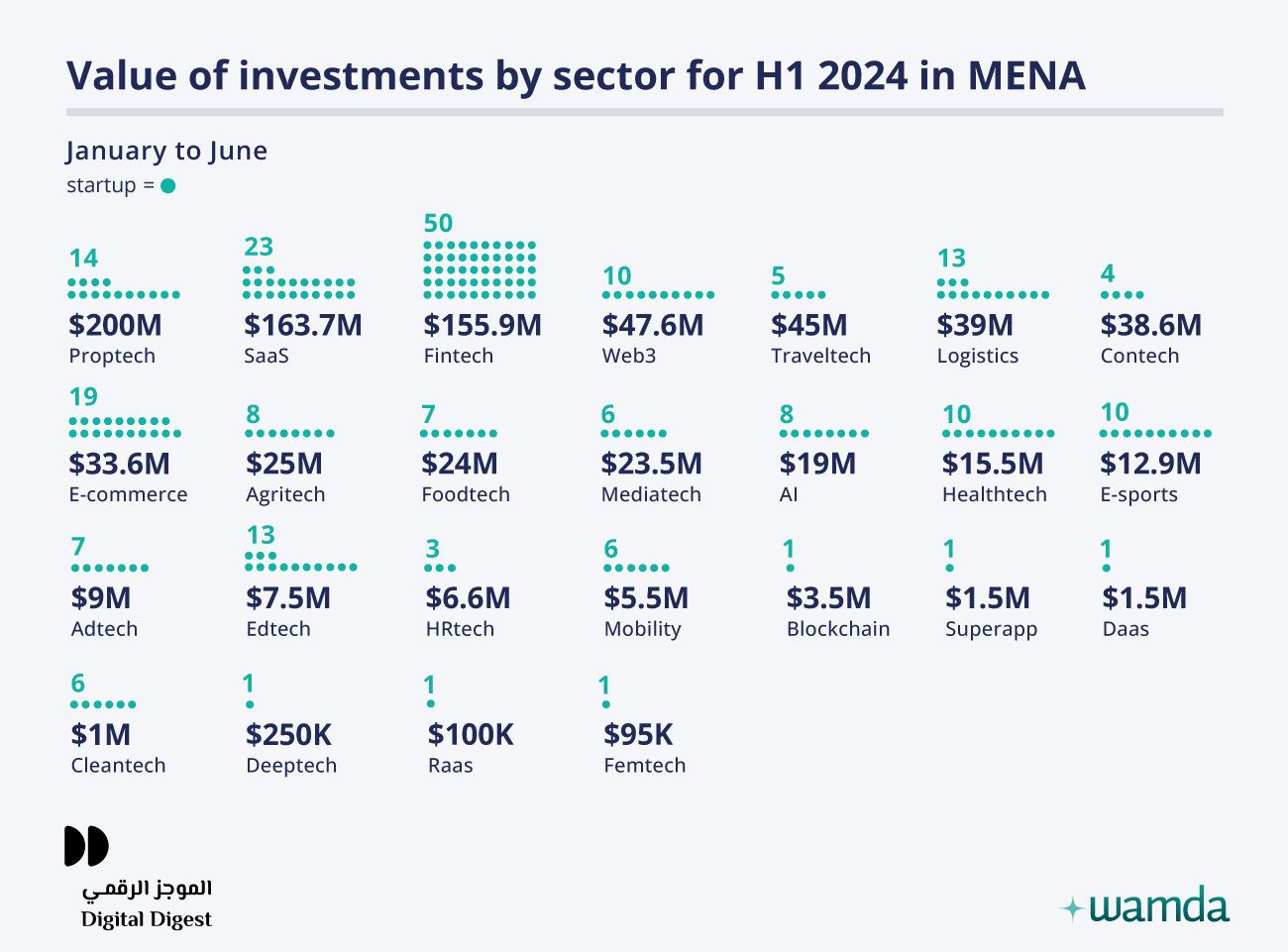
Early stage is the winner
While debt financing accounted for 39 percent of the total budget in the first half of 2023, it accounted for only 17 percent of the budget this year.
Up to 17 Series A startups raised the majority of funding, $169 million, however, investors continued to support the Seed stage, funding 52 Seed rounds with $131 million.
Pre-Series A startups raised $96 million in 17 deals, while Sala’s pre-IPO round alone was $130 million.
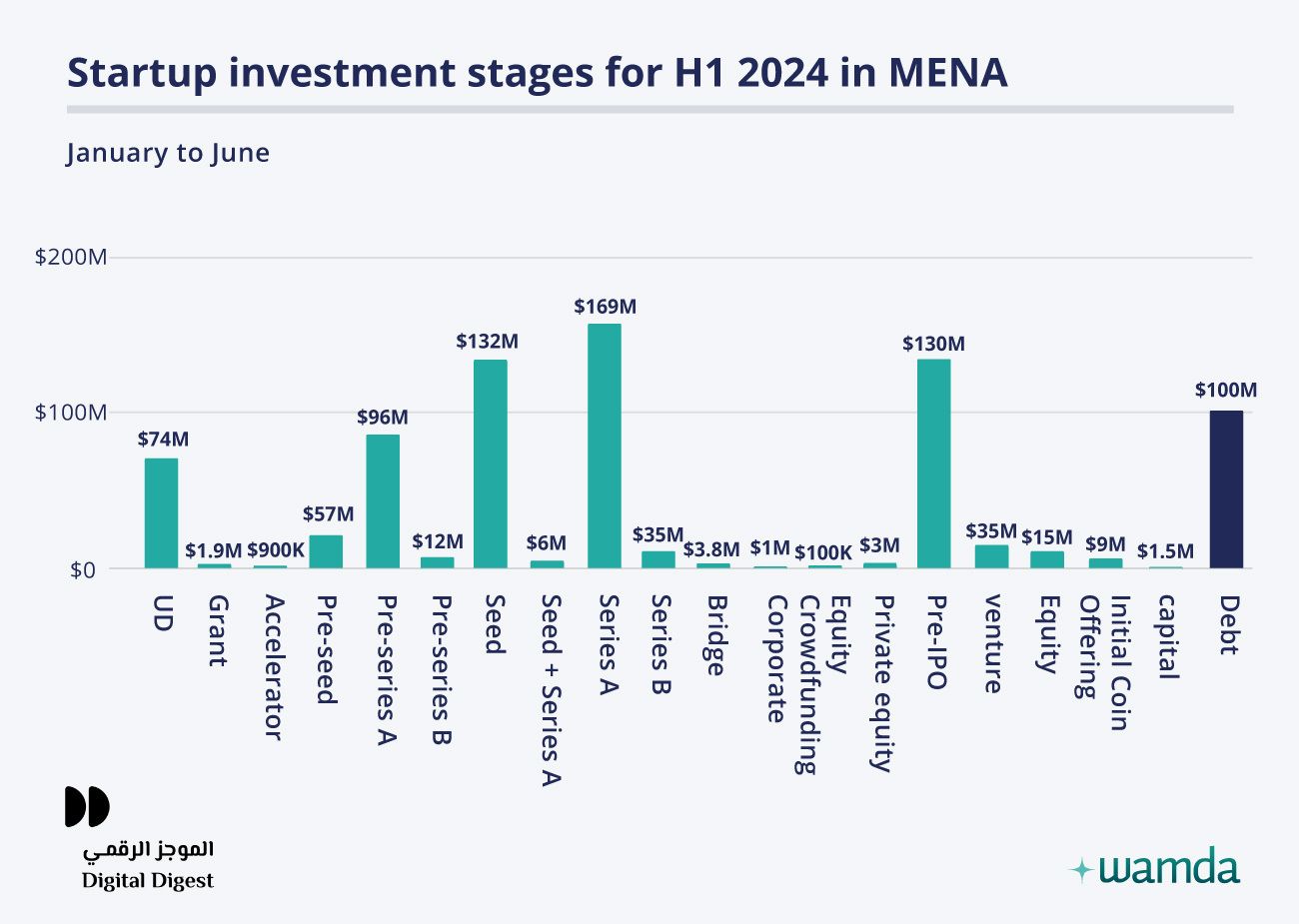
B2B vs. B2C
The business-to-consumer (B2C) model was also hit hard this year, raising $356 million across 86 deals, down 64% from the previous year. On the other hand, the business-to-business (B2B) segment grew by a staggering 153% from $186.6 million in the first half of 2023 to $473 million in 2024.
Another worrisome drop was in dedicated funding for women-led startups, which recorded $1.8 million across 15 deals in the first half of 2024, down from $6 million raised by 22 startups last year. Meanwhile, $760 million was invested in 170 startups led by men.
The best regional investor
In the past six months, most of the funding came from Saudi Arabia-based VCs, which participated in 60 deals in H1, followed by UAE-based VCs, which invested in 41 deals, while Egyptian VCs contributed in 24. They participated in an investment transaction.
The US was the leading foreign investor in the region, investing in 31 startups, followed by the UK with 19 recorded rounds.
Saudi Arabia-based VC RZM Investment and Bahrain Hope Ventures were the most active investors in the first half of 2024, participating in seven deals each, followed by Flat6Labs with six deals and Disruptech with five deals.
Forecast Q3
In the first half of the year, we saw a decline in the investment outlook, but this does not reflect the performance of the rest of the year. We can consider a necessary consolidation to assess the market sentiment towards each sector, or a half-time halt, so that VCs can close their funds, and investors can diversify their investment portfolios based on US Federal Reserve interest rates. Consider.
Over the past six months, several VCs have launched funds, with billions of dollars in commitments to invest in tech companies in the MENA region, which is likely to be reflected in Q3 investment volume.
These monthly reports are in collaboration with Wamda and Digital Digest.
#MENA #startups #raised #million #June #bringing #total #million
